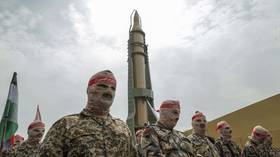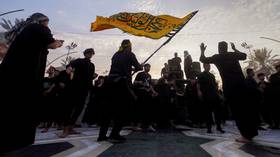The West is trying to pressure Russia through Iran, but is it possible?
Here’s why the US and its allies are afraid of real military cooperation between Tehran and Moscow
Recently, the US and its European allies – including the UK, Germany, and France – once again accused Iran of supplying ballistic missiles to Russia for use in its military operation against Ukraine. These claims were initially published by the Wall Street Journal, Reuters, and CNN. The US State Department at first refrained from commenting, while Kiev immediately threatened Tehran with “devastating consequences.”
A few days later, US Secretary of State Antony Blinken officially accused Iran of escalating the Ukraine conflict, supposedly confirming the Western media’s claims. Following this, the State Department imposed sanctions on Iran Air, the country’s main airline, for “operating in the transportation sector of the Russian Federation economy.” In response, the aforementioned European countries announced immediate measures to suspend bilateral air service agreements with Iran.
This is not the first time that Iran’s main airline has been sanctioned, so it is unlikely that Tehran will be intimidated by this announcement. However, it is evident that Western nations are once again delaying efforts to normalize relations with Iran, despite regularly emphasizing the need to revive the Joint Comprehensive Plan of Action (JCPOA) – the so-called “nuclear deal.”
A few days ago, Iranian President Masoud Pezeshkian held his first press conference and said that since he had taken office, Iran had not supplied missiles to Russia. His predecessor, former Iranian President Ebrahim Raisi, also repeatedly denied transferring weapons to Moscow. Meanwhile, as the West continues to impose strict sanctions on Iran, it audaciously demands that Tehran join the international restrictions against Russia. Apparently, the White House naively believes that Iran would be willing to sever ties with Russia in exchange for a slight easing of Western sanctions, and would also risk worsening its relations with China.
In the past decade, Iran has indeed strived to get the West to lift sanctions, and to reset relations if not with the US, then at least with the EU. In fact, Russia played a key role in bringing Iran and the West to the negotiating table, an effort that culminated in the 2015 nuclear deal. However, the Iranian political establishment has never prioritized immediate economic gains over national interests and security concerns. It’s no coincidence that many Iranian officials note that they feel more comfortable and secure about forming an alliance with Russia and China rather than with Europe, which is becoming less independent with each passing year. At the same time, Iran places a heavy emphasis on self-reliance – a principle that allowed the country to preserve its identity and civilization for thousands of years. As a result, Iran is actively and independently developing its defense industry, which it considers essential for the country’s survival, independence, and integrity.
There is no accurate and current data on weapons production in Iran, and particularly its missile production capabilities. This information is classified and even top military analysts can only make assumptions based on publicly available information, which Iran shares sparingly. Iranian weapons can also be seen at arms exhibitions, including ones held annually in Russia.
However, reports published by Western analysts in 2024 indicate that Iran possesses a military arsenal of cruise and ballistic missiles with a range of several hundred to several thousand kilometers. Iran’s missile program was established in close cooperation with China and North Korea, which significantly contributed to the development of Iran’s missile technologies. Pyongyang previously sold missiles to Tehran and together with Beijing provided comprehensive support for Iran’s missile development program. In the past 25 years, Iran has cultivated a skilled workforce and a reliable technological base, enabling it to effectively utilize the expertise gained from North Korea and China.
Seeking to strengthen its influence in the region, Iran has focused on enhancing its military capabilities, particularly developing its military industrial complex. The Iranian military sector encompasses nearly all areas of weapons production, including aviation, artillery, armored vehicles, munitions, electronics, naval construction, and chemical warfare. However, the country prioritizes missile development over conventional arms manufacturing. Iran has about seven major centers dedicated to missile technology research and production. They are overseen by the Islamic Revolutionary Guard Corps (IRGC), which plays a crucial role in Iran’s military industrial complex.
Iran’s missile forces, once part of the IRGC, now report directly to the Supreme Commander, Supreme Leader Ayatollah Ali Khamenei, which highlights their growing importance. Coincidentally, Western nations and Iran’s opponents in the Middle East (particularly Israel) initially considered reports of Iran’s developing missile industry with skepticism and even mockery. With their characteristic bravado, Western media claimed that Iran was only capable of producing ‘rusty pans’ that would be destroyed in no time should Tehran dare to attack Israel. This sarcasm was rooted in the belief that Western sanctions and a lack of modern technologies would prevent Iran from acquiring advanced weapons for the next 100 years.
However, the West’s attitude changed over time. Iran’s nuclear program, initiated in the early 2000s, marked a turning point, prompting European leaders to recognize that the situation was far more serious than they had assumed. In recent decades it has become clear that Iran possesses considerable military capabilities, mostly developed through its own efforts and domestic technologies – a fact that particularly irritates Israel and the West.
Furthermore, amid escalating tensions between Israel and Hamas, Iran’s defense industry operates in almost wartime capacity, especially as Iran and Israel teeter on the brink of a direct war (note the unprecedented strikes against Israel from Iranian territory in April 2024, and the recent assassination of Hamas leader Ismail Haniyeh in central Tehran). Moreover, based on the latest reports from Lebanon and the recent mass explosions of pagers, it seems that Israel is not about to de-escalate the conflict, and is raising the stakes.
Despite the fact that Israel has not claimed responsibility for these events or provided any comment, Tehran was quick to accuse it of terrorism. Ironically, just a day before the attacks in Lebanon, Iran’s president talked about peace and even referred to Americans as “brothers.” Nonetheless, this didn’t seem to deter Israel, which is determined to launch a large-scale ground operation against Hezbollah – Iran’s key asset in the region. As a result, Iran may have no choice but to respond decisively.
Returning to our original topic – the alleged supplies of weapons to Russia – we must examine the actions of Western countries and Iran in this regard. As we’ve said earlier, President Pezeshkian has clearly stated that Tehran does not supply weapons to Russia. Neither does it provide arms to its closest regional allies, such as Yemen’s Houthis. This was stated by Iran’s foreign minister, Abbas Araghchi, who implied that sending Iranian weapons to Yemen would insult the Yemeni people, who are fully capable of defending themselves. However, these statements have clearly not satisfied the West. The very next day after the US officially accused Iran of supplying missiles to Russia, US Secretary of State Blinken and UK Foreign Secretary David Lammy met with Ukrainian leader Vladimir Zelensky in Kiev. Throughout this time, Ukraine has been trying to get permission to use long-range Western weapons to strike deep into Russian territory. Washington noted that the position of the US and UK on this matter changed following information that Iran had sent missiles to Russia. Meanwhile, the UK, Germany, and France issued a joint statement labeling the delivery of Iranian missiles as “a direct threat to European security.”
All this raises a logical question: Is the exaggerated hysteria surrounding the imaginary Iranian missiles merely a “legitimate” excuse to permit Kiev to strike deep into Russian territory? It is well known that among Western politicians there are some staunch Russophobes who have been trying to convince their governments to officially permit Kiev to target Russian territory. Meanwhile, they are fully aware of the potential consequences of such a reckless move – Moscow has sent a clear signal to both Washington and London, indicating that this is no time for jokes.
Blinken, EU foreign policy chief Josep Borrell, and other US and EU politicians have repeatedly warned Tehran against supplying weapons to Russia, implying that it would make Iran a participant in the Ukraine conflict. Which makes us wonder – following their own logic, why do these officials deny their involvement in the conflict? Western arms supplies to Ukraine have continued without interruption for the past two and a half years, and regardless of what some may claim, without Western weapons and the financial support of the US and the EU, the Kiev regime would fall within several weeks. Following this logic, if supplying the Russian side with weapons makes Tehran a party to the conflict, then what about Paris, London, Berlin, and others who supply Ukraine with weapons, thereby perpetuating the war?
Moreover, there is another sensitive issue: who has the right to dictate to Iran and Russia whether they should pursue or terminate cooperation in the military-political sphere? Both Iran and Russia are independent states and have a sovereign right to strengthen their relations in whatever ways they deem necessary. Moscow and Tehran are also preparing to sign a comprehensive partnership agreement. This agreement not only aims to initiate cooperation in the security field but also solidifies the strategic partnership between the two countries. Consequently, neither the West nor any other party holds the authority to intervene or dictate how Russia and Iran should develop their relations in the field of defense. It’s important to note that while Iran does not supply arms to Russia, this does not imply that the Islamic Republic has no right to supply its weapons to any country, including Russia. If Moscow and Tehran ever decide to discuss this matter, they will do so without seeking permission from the White House or Brussels, since these issues concern only the two countries.
No matter how much the West tries to intimidate Iran or lure it with the promise of lifting sanctions, Tehran understands that in the near future, there’s little hope for cooperation with either the US or its allies. For Iran, it’s far more practical to weather the storm and maintain its reputation as a reliable partner than to sit around waiting for the West to initiate a constructive and meaningful dialogue.








Comments are closed.